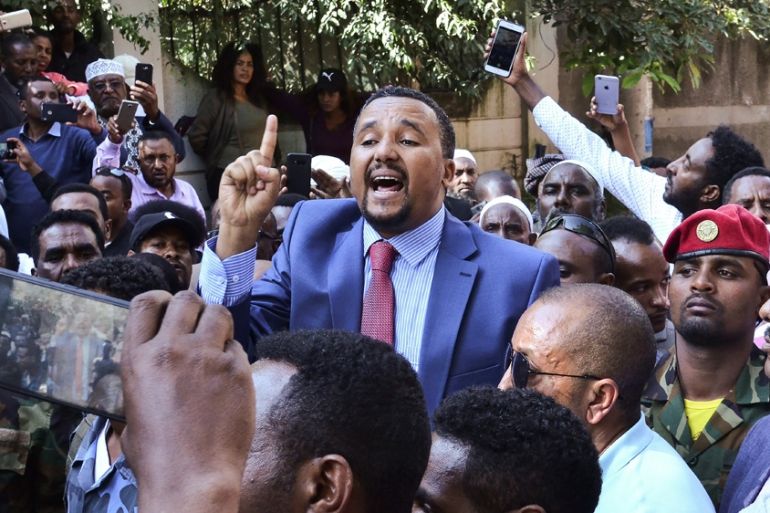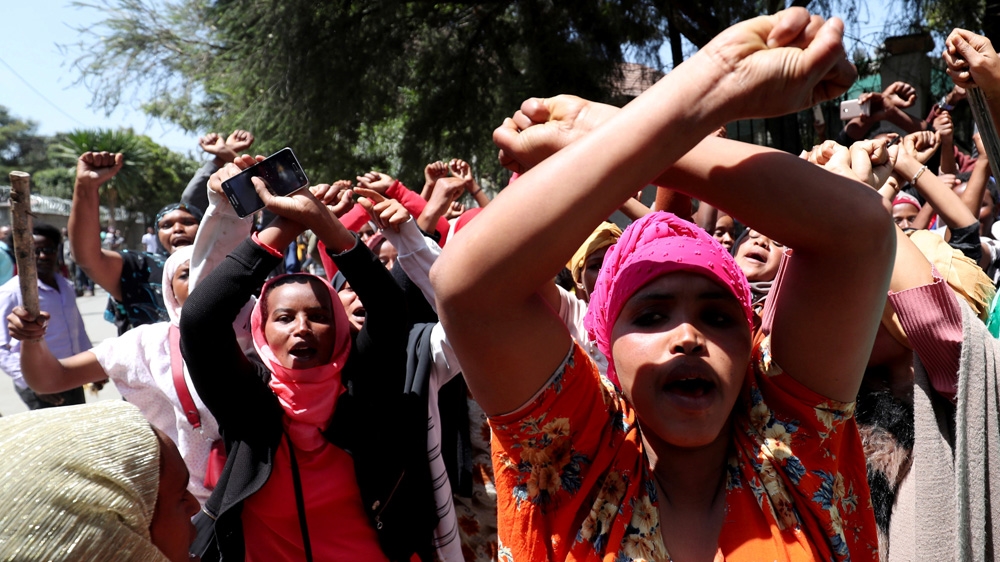Prominent activist may challenge Ethiopian PM in 2020 election
Jawar Mohammed’s comments come as Oromia police commissioner says death toll in two days of protests stands at 67.

Prominent activist and media entrepreneur Jawar Mohammed has said he might challenge Ethiopian Prime Minister Abiy Ahmed in elections planned for next year, accusing him of resorting “to the early signs of dictatorship”.
Jawar, who spoke to reporters at his home in Addis Ababa on Friday, had earlier accused security forces of trying to orchestrate an attack against him, prompting protests by his supporters in the capital and across Ethiopia’s Oromia region on Wednesday and Thursday. Police denied Jawar’s claim.
Keep reading
list of 3 itemsEthiopia’s PM Abiy Ahmed wins Nobel Peace Prize
Ethiopia: Youth gather at Jawar Mohammed’s house to show support
Amnesty International has said at least 16 people have been confirmed dead in the unrest but that the actual toll is likely higher. Late on Friday, Oromia’s police commissioner told Reuters news agency the death toll in two days of protests included 62 protesters and five police officers. Kefyalew Tefera said 13 people died from bullet wounds and the rest from wounds caused by stones.
In an interview with the AFP news agency earlier in the day, Jawar alleged that Abiy – who two weeks ago was awarded the Nobel Peace Prize for pursuing regional peacemaking efforts and democratic reforms – seemed to be taking Ethiopia back to “the old ways” of authoritarian rule.
“[Abiy] has resorted to the early signs of dictatorship, of trying to intimidate people, even his very close allies who helped him come to power who happen to disagree with some of the policies and positions and ideologies he’s advocating,” Jawar said.
“Intimidation is the start of authoritarian rule.”
Abiy has not directly addressed Jawar, but on Tuesday expressed frustration with “media owners” who are seen to be promoting ethnic agendas ahead of Ethiopian unity. The comments were viewed by many as a not-so-veiled reference to Jawar.
Divisions exposed
The developments underscore a growing rift between the prime minister and Jawar, an Ethiopian-born US citizen and founder of the Oromia Media Network who had previously mobilised a movement of young men in Oromia from 2016 to 2018 that led to anti-government protests and paved the way for Abiy to take power.
Abiy, who like Jawar is from the Oromo ethnic group, has since enacted sweeping political reforms in the country which had suffered decades of repressive rule.
The greater freedoms in the country have exposed long-repressed tensions within and between Ethiopia’s many ethnic groups.
|
|
Jawar said his supporters have stopped believing in Abiy’s promises of reform and accuse the prime minister of centralising power, silencing dissent and jailing political prisoners.
Amnesty International has said that, since the prime minister took office, there have been several waves of mass arrests of people in the Oromia region perceived to be opposed to the government.
The “ruling party and its ideology will be challenged seriously not only in the election but also prior to the elections”, Jawar told Reuters News Agency on Friday.
He said that running against Abiy in the election planned for 2020 was only “one possibility”, though he also said he could be convinced to back the prime minister if he changes course, according to AFP.
“I want to have an active role in the coming election. In what capacity I’m not sure, but I want to make sure that the influence I have in the country has a positive contribution,” he said.

After two days of violent protests, tensions had cooled on Friday in Addis Ababa, though the damage inflicted by the unrest there and across the Oromia region was still being tallied.
Amnesty researcher Fisseha Tekle told the AFP the violence had included instances of security forces opening fire on protesters, but was increasingly taking the form of ethnic and religious clashes.
“Some people have lost their lives with sticks, with machetes, some houses have been burned. People have been using even bullets and light arms to kill each other, to fight each other,” he said.
At least six people were killed in the town of Ambo, west of the capital, after security forces opened fire on protesters, Fisseha said.
Ethnic and religious violence has also been reported in the towns and cities of Dodola, Harar, Balerobe and Adama. While Ethiopian officials have provided little information on casualties, they did confirm two deaths in Adama earlier this week.
On Friday afternoon, the defence ministry said the army had been deployed to seven cities where there had been protests this week “to calm the situation in collaboration with elders and regional security officers”, Major General Mohammed Tessema told a press conference in Addis Ababa.